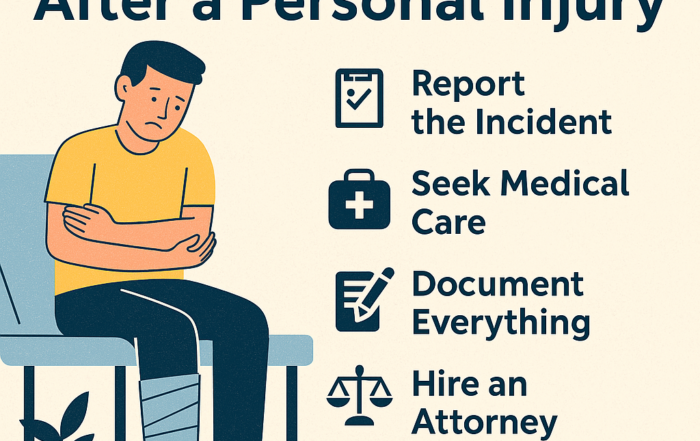Frequently Asked Questions
Have You Been Hurt or Injured in an Accident?
The amount of time it takes for a personal injury lawyer to settle a case can vary greatly depending on a number of factors, such as the complexity of the case, the willingness of the parties to negotiate, and the availability of relevant evidence. In some cases, a personal injury case may be settled relatively quickly, perhaps within a few months, while in other cases it may take much longer, possibly even several years. Ultimately, the length of time it takes to settle a personal injury case will depend on the specific circumstances of the case.
The percentage that personal injury attorneys get from a settlement or court award varies depending on a number of factors. In many cases, personal injury attorneys work on a contingency basis, meaning they will not charge a fee unless they win your case. If they do win, they will typically receive a percentage of the settlement or award as their fee. This percentage can range from 33% to 40% in most cases, but it may be higher or lower depending on the specific circumstances of your case. It is important to discuss fees and payment terms with your attorney before hiring them to represent you.
When choosing a personal injury attorney, it is important to consider the following:
- Experience: Choose an attorney who has experience handling personal injury cases similar to yours. This will increase the chances of a successful outcome.
- Reputation: Look for an attorney with a good reputation in the legal community and among former clients. You can ask for recommendations from friends and family members, or research online reviews and ratings.
- Communication: Choose an attorney who is good at communicating and keeps you informed about the status of your case. This will help you feel confident and in control of the situation.
- Fees: Consider the attorney’s fees and payment terms before making a decision. Many personal injury attorneys offer free initial consultations and work on a contingency basis, meaning they will not charge you unless they win your case.
Overall, the best way to choose a personal injury attorney is to do your research and carefully evaluate your options. This will help you find an attorney who is qualified, reputable, and a good fit for your needs.
The amount of time you have to file a lawsuit after an injury varies depending on the type of case and the laws of the state where the injury occurred. In general, however, most personal injury cases must be filed within a few years of the date of the injury. This is known as the statute of limitations. If you miss the deadline for filing your lawsuit, you may be barred from pursuing your case in court. It’s important to consult with an experienced personal injury attorney to determine the specific deadline for filing your lawsuit and to ensure that your case is filed on time.
Yes, a personal injury lawyer can drop your case. Attorneys have the right to terminate the attorney-client relationship at any time, and for any reason, as long as they do so in a professional and ethical manner. There may be consequences for the attorney if they drop your case without good reason, such as a violation of their professional responsibilities or ethics. However, in general, attorneys are allowed to drop cases if they believe it is in their client’s best interests or if they are unable to continue representing the client for any reason. If you are concerned that your attorney may drop your case, it’s best to discuss your concerns with them directly.
Yes, you can fire your personal injury attorney. As the client, you have the right to terminate the attorney-client relationship at any time and for any reason. However, there may be consequences to consider before you decide to fire your attorney. For example, if you have signed a contract with your attorney, you may be required to pay a fee for terminating the contract early. Additionally, if you have already begun litigation, terminating your attorney may delay the case. It’s important to weigh these potential consequences carefully before deciding to fire your attorney. If you do decide to terminate the relationship, it’s best to do so in writing to avoid any misunderstandings.
In general, personal injury settlements are not taxable. This is because the IRS does not consider personal injury damages to be income. However, there are some exceptions to this rule. For example, if you received a settlement for lost wages, the portion of the settlement that is intended to compensate you for lost income may be taxable. It’s also worth noting that punitive damages, which are damages awarded in cases where the defendant’s conduct was particularly egregious, are always taxable. It’s always a good idea to consult with a tax professional or an attorney to determine how your settlement may be taxed.
Personal injury attorneys can be worth it because they can help you receive compensation for your injuries and losses. They can help you navigate the legal system and ensure that your rights are protected. Personal injury attorneys are experienced in dealing with insurance companies and can negotiate a settlement on your behalf. They can also represent you in court if necessary. It’s important to remember that every case is different, so it’s best to consult with a personal injury attorney to determine if hiring one is the right decision for you.
“Personal Injury” is a broad term that means any kind of accident or occurrence that leads to bodily injury. This includes not only injuries related to automobile accidents but also injuries related to slip and falls, trip and falls, negligent security, cruise ship injuries, etc.
We charge on a contingency-fee basis. This meaning that you will not pay us any fee unless there is a settlement or a winning verdict at trial. Typically, our fee is one-third or 33.3% of the total recovery in addition to case costs (money that we pay out to others in order to prepare your case).
The case value is based on several areas, assuming the liability issue is straightforward. Those areas include:
- Past Medical Bills
- Future Medical Bills
- Past Lost Wages
- Loss of Earning Capacity in the Future
- Pain and Suffering
A case value is also affected by other evidence such as: whether there are discrepancies in the testimony, medical records, or other evidence that may detract from the injured party’s case.
Every client is an individual and the recovery time varies with each person. Often a case cannot be resolved until we are able to determine the full extent of the injuries sustained. That may require time for surgery, rehabilitation, etc.
With that in mind, the average premises liability/auto or general negligence cases will reach resolution in four months to a year. That timeline is bound to fluctuate depending on the characteristics of each case.
Medical facilities and doctors will sometimes accept a “letter of protection,” which is a document allowing the patient to continue treatment without having to pay for it until a later date. In some cases, people may lack insurance coverage or their PIP benefits have been depleted. In these cases, a medical provider may request a letter of protection. It is essential that the client understand that if the case is not resolved in their favor, the client would still be responsible for paying their medical bills even if there is a letter of protection on file.
MMI is your maximum medical improvement as determined by your treating physician. At the conclusion of your treatment, we often request a final narrative that includes your MMI. This means that the patient has reached a point where they are as healthy as they can be. They may not be in the condition that they were prior to the accident, but their health has stabilized. If that is the case, a doctor may assign the patient a permanent impairment rating according to American Medical Association guidelines. Automobile insurance companies may want access to the permanent impairment rating as part of their case evaluation.
“Filing suit” is the act of filing legal papers at the courthouse. The client gives the authorization to file suit after all other options have been exhausted during pre-suit. When a case is filed with the court, it does not necessarily mean you will be going to trial and most cases are resolved before a trial begins.
Your primary goal is to get healthy and recover from your accident. We will collect information about your case; we collect documents to include the full police report, insurance information, medical records, and bills. When possible, we collect photographic evidence of the scene of the injury, the property damage, and bodily injuries. If necessary, we may interview witnesses and hire expert witnesses. Then, we submit a demand for settlement to the insurance company and negotiate with them. If we don’t reach a settlement at that point, we discuss filing a lawsuit. While in a lawsuit, we engage in discovery, which is the exchange of paperwork and information with the insurance company’s attorneys. Next come depositions, where they question our client and we question theirs. Other witnesses may also be deposed. Then the insurance company might have our client examined by their doctor. Last is trial. A lawsuit can settle at any point along the way if the parties can come to an agreement or if the discovery process reveals information that causes one party to change its position.
Your Recovery Begins With A Phone Call
Bell & Bell will aggressively pursue compensation for your loss.



